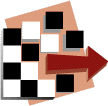
At one point in the discussion, Grigar noted that the journal seemed to be leaning toward more "regular features," even at times utilizing templates or specific guidelines, and wondered if that might not quite be true to the original conception of the publication, or even to the original meaning of the word "kairos." Dr. Barber added, clearly joking, but with a point to be made, "Maybe you should rename the journal Stasis."
When I repeated Barber's gentle jab at an ensuing panel at the conference, computers & composition publishing guru Cindy Selfe nearly fell off her chair laughing. It is a good line! And let's face it -- we do have an "InterMOO" [here's the first one] every issue [here's the latest one]; we have some more settled, if not yet comfortable notion of what a Coverweb [here's the first one] should look like [here's the latest one], and provide protocols to contributing authors, prescribing link styles, requiring authorship of an External Links page and a Bridge page ...
Five issues ago, we didn't know what any of these words meant much less that they could be limited within certain parameters. We are, as I have been saying every time I speak about Kairos at a conference or seminar, making it up as we go along. We hit "Reload" a lot.
Given our original mission as a publication -- to provide a peer-reviewed resource where scholars could publish items in native hypertextual formats that would appear reasonable on an academic vitae -- I don't think the consistency and parameters we have adopted are all bad. And I know that Barber, a member of the Editorial Board, and Selfe, a vocal supporter of Kairos and its cousin publication RhetNet, don't think so either.
That's in part because, true to the name "kairos," we have in fact been re-inventing ourselves every issue, more so than a paper-based journal ever could, and yet within enough consistency to allow readers to move bewteen issues, even within issues, and not be suddenly (and accidentally) lost or frustrated.
The changes -- the "kairic" part of this journal -- are inevitably people changes. This issue is no different, as for the third consecutive occasion of our publication, we have staff and board changes to announce. Given that our major source of contribution and maintenance of this journal comes from graduate students, we are never surprise when someone steps away to work on a dissertation, or bows out because of a change of schools, meaning personal uncertainty.
So while our interface -- how you get to the texts published in Kairos -- may appear more and more "static," who is producing and publishing them is "kairic" in the truest sense. And not only who is publishing, but how -- you may compare each Coverweb, or contributions from Karen Chauss in 1.2 to Tonya Browning in 2.1, or Johndan Johnson-Eilola in 1.1 to Lee Libby in this issue, or even Tim Krause's contribution in 1.1 to Tim Krause's contribution in 1.3 -- and as similar as they may appear thematically, it is the shape of the individual author's publication that expresses his or her most meaningful contribution to hypertextual scholarship. We may control the Table of Contents -- but that space that lies beyond the bridge page, behind the hyperlink under the author's abstract ... that is "radical occasionality and re-invention of the present occasion (Eric Charles White's definition of "kairos") to a spectacular degree.
You will note that we are also expanding -- changing, Cindy! -- the borders of Kairos as we take on new and (we hope) innovative ways of exploring the limits of text production. Our partnership with LinguaMOO will allow a realtime discussion of the work produced in Kairos and the new Meet the Authors series will further challenge what it means to be "puhlished," or as we might imagine, "public-ed" with one's text.
Finally, I should note that we have taken on a rather ambitious project -- creation of a Kairos FAQ ... this is something that I, personally, had resisted doing, against the wishes of numerous staff members. I felt that publishing a FAQ could be seen as normative and prescriptive, and might limit the possibilities of radical occasionality covered by new technologies and brilliant virtual scholars we have not yet had -- well, occasion -- to meet.
We publish this FAQ only as a starting point, and will actually re-publish it every issue after actively seeking feedback about what questions should be answered, and which ones were not answered to your satisifaction from any and all readers, writer, and teachers in webbed environments.
Mick Doherty is the founding editor and publisher of Kairos. He is the Internet Editor for the Dallas Convention & Visitors Bureau, and working toward completing a PhD in Rhetoric & Electronic Publication at Rensselaer Polytechnic Institute.